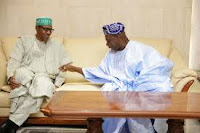A former Nigerian president,
Olusegun Obasanjo, has implored President Muhammadu Buhari to establish
dialogue with the leader of the separatist Indigenous People of Biafra, IPOB,
Nnamdi Kanu. Mr. Obasanjo, who said this during an interview with the Newsweek
Magazine, noted that the dialogue would curb the secessionist agitation in the
South-east region.
Mr. Kanu is the arrowhead of a new wave of separatist agitation in the South-east, which has triggered apprehension and unrest among the people in the region.Due to the agitations and criminal activities in the region, the Nigerian Army recently launched its Operation Python Dance II in that part of the country. The launch of the operation led to skirmishes between Nigerian soldiers and IPOB members, leading to a wave of unrest in the region, especially in Aba, Abia state.
The former president said he had seen too many wars and it was time for Nigeria to move on, stressing that he believed enough dialogue had not been established by both the government and the group. According to the former president, secession is not the solution to challenges bedevilling the nation.
“Those who fought in the war in Biafra will not want to fight any other war. I fought in that war and it was an unfortunate war and I said I had fought one war too many in Nigeria; I don’t want to see another.“The heavy boot is not the solution. I believe also whatever may be the frustration of any youth in any part of Nigeria; I believe secession is not the solution.“We need to satisfy the youth in job creation, in wealth creation, in giving them a better, fulfilled life, in giving them hope for the future. There’s no easy way out,” he said.
Mr. Obasanjo, a former military ruler, fought in the Nigeria civil war that took place between 1967 and 1970.He also received the final instrument of surrender from the separatist Biafran army, headed by the late Odumegwu Ojukwu, when the war ended in 1970.
Mr. Kanu is the arrowhead of a new wave of separatist agitation in the South-east, which has triggered apprehension and unrest among the people in the region.Due to the agitations and criminal activities in the region, the Nigerian Army recently launched its Operation Python Dance II in that part of the country. The launch of the operation led to skirmishes between Nigerian soldiers and IPOB members, leading to a wave of unrest in the region, especially in Aba, Abia state.
On Friday, the Nigerian Army
declared Mr. Kanu’s IPOB a “terrorist organisation”. Hours after the Army’s
declaration, the Southeast governors’ forum at a meeting in Enugu also proscribed
the separatist organisation. But Mr. Obasanjo said there was nothing wrong if
Mr. Buhari established dialogue with the leader of the separatist movement. “I
don’t see anything wrong in that. I would not object to that; if anything, I
would encourage it,” he said. “I would want to meet Kanu myself and talk to
people like him, people of his age, (and ask) ‘What are your worries?’ Not only
from the South-east but from all parts of Nigeria.”
The former president said he had seen too many wars and it was time for Nigeria to move on, stressing that he believed enough dialogue had not been established by both the government and the group. According to the former president, secession is not the solution to challenges bedevilling the nation.
“Those who fought in the war in Biafra will not want to fight any other war. I fought in that war and it was an unfortunate war and I said I had fought one war too many in Nigeria; I don’t want to see another.“The heavy boot is not the solution. I believe also whatever may be the frustration of any youth in any part of Nigeria; I believe secession is not the solution.“We need to satisfy the youth in job creation, in wealth creation, in giving them a better, fulfilled life, in giving them hope for the future. There’s no easy way out,” he said.
Mr. Obasanjo, a former military ruler, fought in the Nigeria civil war that took place between 1967 and 1970.He also received the final instrument of surrender from the separatist Biafran army, headed by the late Odumegwu Ojukwu, when the war ended in 1970.

Comments
Post a Comment